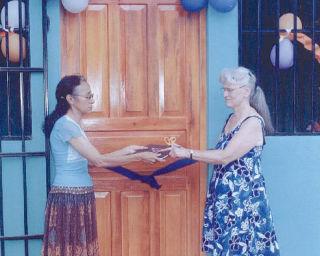
Seva Does the Body (Mind and Spirit too!) Good
Those that join the teaching profession tend to be do-gooders. I recently came upon a Houston (Canada, not Texas!) teacher, Carroll Airey.
Carroll Airey is making a difference.
Airey, a retired Twain Sullivan teacher-librarian, has been fundraising for a town in Nicaragua — Santa Rosa del Penon — for almost 10 years.
Airey’s reach into Central American began in 1998 after Hurricane Mitch tore through the country. Airey set up the Children Helping Children club at Twain Sullivan and the group managed to raise $10,000 that helped out two communities: Santa Rosa del Penon and El Bosque. [link]
The article describes some of Carroll’s exceptional work. Through the sales of Fair Trade organic coffee, tea, and chocolate she has helped support a maternity clinic, nutrition program, garden project, and a sewing school. Recently, while in Nicaragua, she has begun efforts to house a library and a small computer center. Googling her on the internet, I found that she has also initiated a global arts exchange program between children in Houston (Canada, not Texas!) and Santa Rosa del Penon (Nicaragua).
So how does she do it? And here is where it gets really interesting.
“It’s really heartwarming to think that people here will trust me to deliver their donations,” she said, adding the Sikh community has been especially generous. “It’s awesome for me to be able to build this relationship between people here and people [in Nicaragua].” [emphasis added]
The Sikh community? Now the only South American country with a significant Sikh population is Argentina and that is a long way from Nicaragua.
So while the media in BC would rather focus on T-shirts and Vaisakhi floats, it is great to see that somewhere buried in the back, if it is even covered at all, are many Sikhs that are engaged not only with their local communities, but with the global community as well.
As far as Carroll’s reasons for starting the project:
“I’m hoping to teach the kids here about how fortunate they are to be living in Canada and to show the difference between what life is like in a developing country and their life,” she said. “I also want to try to build in them some type of compassion for people who are less fortunate.”
Sounds like something great, indeed.














If all parties play their role, homework is meant to be a link between teachers, parents and the students. However, how many parents even look at the homework books of their children?
dell